This biennial report features seven Ryan White HIV/AIDS Program recipients who have implemented successful strategies and innovative approaches to HIV care—including a jurisdictional approach to EHE planning, linking care to incarcerated people with HIV, telehealth and telepsychiatry services, peer navigation services, housing and employment services, technology to provide clinician education, and a Community-Based Dental Partnership Program. These and other recipients of HRSA's RWHAP provide inspiration for ending the HIV epidemic in the U.S. and ensuring resilience during the COVID-19 pandemic.
The Table of Contents is listed below but to access the full document, you can go to: https://hab.hrsa.gov/data/ryan-white-hivaids-program-biennial-reports then just scroll down to the Current Biennial Report.
The MidAtlantic AETC is featured starting on page 46 (highlighted in green in the Table of Contents below).
Direct link to the report: https://hab.hrsa.gov/sites/default/files/hab/data/biennialreports/hrsa-biennial-report-2021.pdf
Report Table of Contents (with page numbers)
Foreword
Resilience and Innovation to End the HIV Epidemic in the U.S.: 2021 Ryan White HIV/AIDS Program Highlights.........................2
-
Highlights of the Virtual 2020 National Ryan White Conference on HIV Care & Treatment.........................3
-
Ryan White HIV/AIDS Program Annual Client-Level Data Report, 2019.........................4
-
Ending the HIV Epidemic in the U.S.........................6
-
HIV National Strategic Plan.........................7
-
FY 2020 Coronavirus Aid, Relief, and Economic Security Act Funding.........................7
Summary of Innovative Approaches
-
Summary of the Innovative Approaches Used by Featured Recipients.........................10
Success Stories
-
Engaging the Community to End the HIV Epidemic in Connecticut: New Haven Health Department (Part A).....14
-
In It to End It: Our Plan to End the HIV Epidemic.........................15
-
Engaging Stakeholders in the Planning Process.........................16
-
Obtaining Input From People With HIV.........................17
-
Demonstrating Resilience During the COVID-19 Pandemic.........................18
-
Key Successes and Lessons Learned.........................19
-
-
Ending the HIV Epidemic in Kentucky Through Community Engagement: The Kentucky Department for Public Health, Cabinet for Health and Family Services (Part B).....21
-
Kentucky Ending the HIV Epidemic Strategic Plan for 2021–2026.........................22
-
Bringing RWHAP to Incarcerated People With HIV.........................23
-
Engaging People With HIV Through Other KDPH RWHAP Programs.........................24
-
Demonstrating Resilience During the COVID-19 Pandemic.........................25
-
Key Successes and Lessons Learned.........................27
-
-
Telehealth Services During the COVID-19 Pandemic and Beyond: Prism Health North Texas (Part C)......28
-
Providing Comprehensive Services Through Telehealth and Telepsychiatry.........................29
-
Building and Maintaining Partnerships.........................30
-
Demonstrating Resilience During the COVID-19 Pandemic.........................31
-
Key Successes and Lessons Learned.........................33
-
-
Improving HIV Care Through Peer-to-Peer Connections: Medical College of Wisconsin (Part D).........................34
-
Planning the Peer Navigator Program.........................35
-
Implementing the Program: Recruitment and Peer Matching.........................36
-
Demonstrating Resilience During the COVID-19 Pandemic.........................38
-
Key Successes and Lessons Learned.........................39
-
-
Improving Health Outcomes for People With HIV Through Employment and Housing Services: City of Kansas City, Missouri Health Department (Part F: Special Projects of National Significance Program).....40
-
Engaging People With HIV in the KC Life 360 Initiative.........................41
-
Enrolling and Onboarding Clients Into KC Life 360.........................41
-
Demonstrating Resilience During the COVID-19 Pandemic.........................43
-
Key Successes and Lessons Learned.........................44
-
-
Using Technology to Provide Clinician Education and Improve HIV Care: The MidAtlantic AIDS Education and Training Center (Part F: AIDS Education and Training Centers).....46
-
Engaging in High-Priority Activities to End the HIV Epidemic.........................46
-
Learner Education and Practice Portal.........................47
-
Demonstrating Resilience During the COVID-19 Pandemic.........................48
-
Key Successes and Lessons Learned.........................49
-
-
Engaging People With HIV in Dental Care: Rutgers School of Dental Medicine Community-Based Dental Partnership Program (Part F: Dental Programs).....51
-
Integrating Trauma-Informed Care Into Dental Practices.........................52
-
Retaining Clients in Dental Care: RSDM’s Recall Recovery Program.........................53
-
Engaging Dental Providers Through Community-Based Learning Experiences.........................54
-
Demonstrating Resilience During the COVID-19 Pandemic.........................55
-
Key Successes and Lessons Learned.........................57
-
Thank you and feel free to contact us at maaetc@pitt.edu with any questions or comments. Thank you!



